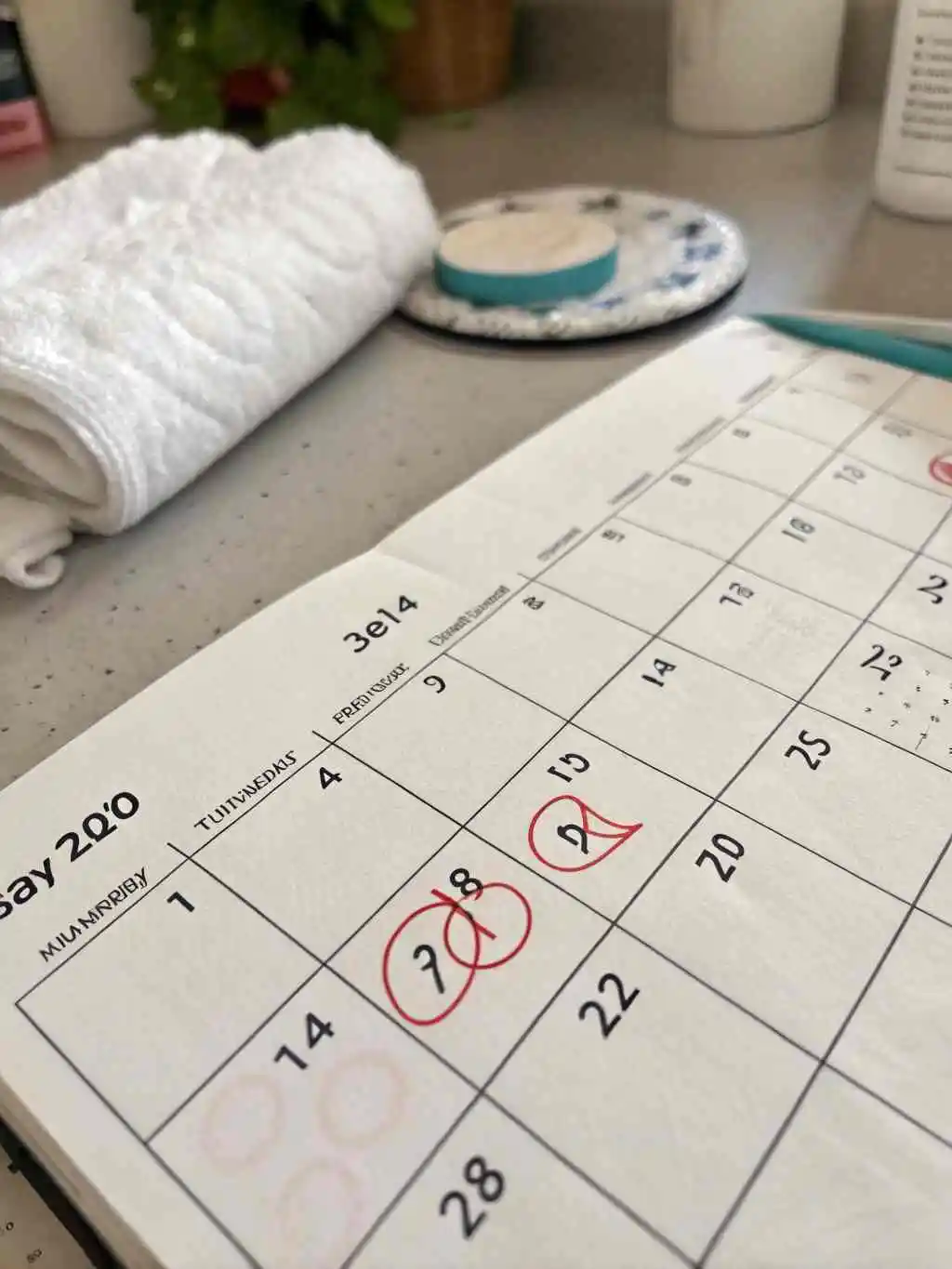Last updated on July 9th, 2025
Zepbound and period changes have become one of the most talked-about and least understood topics among women using this new weight loss medication. While Zepbound (tirzepatide) is widely praised for reducing appetite and supporting blood sugar balance, many women are blindsided by what it does to their menstrual cycles. From missed periods to unexpected spotting, and even painful cramps that feel different from anything before, your hormones are responding to much more than weight loss.

This article uncovers the truth about Zepbound and period disruptions, backed by science and real user experiences. You’ll learn how this GLP-1 receptor agonist alters fat-based hormone storage, why some cycles disappear while others last way too long, and how estrogen and progesterone are affected during treatment. We’ll also address how medications like Wellbutrin, semaglutide, and selenium supplements could further impact your menstrual cycle.
By the end, you’ll not only understand what’s happening you’ll have real solutions to help your body adjust. This includes knowing what to eat on Zepbound to reduce side effects, how to track your symptoms effectively, and when it’s time to reach out to your healthcare provider. With the right foods and strategies, you can ease the transition and support your body throughout the journey.
Table of Contents
Table of Contents
Understanding the Link Between Zepbound and Your Menstrual Cycle
How Zepbound Works in the Body
Zepbound and period changes are a direct result of how this medication works at a cellular level. Zepbound (tirzepatide) is not just a weight loss drug it alters how your body digests food, balances blood sugar, and burns stored fat. But here’s where it gets more complex: as your fat cells shrink, they release estrogen a hormone stored in fat tissue. This sudden estrogen release can create a hormonal wave that throws your menstrual cycle off track.
Many women report cycle disruptions within the first few weeks of starting Zepbound. That’s because hormonal balance is deeply connected to your body fat and insulin levels. By altering both, Zepbound ends up influencing your monthly cycle more than you might expect.
In fact, the relationship between Zepbound and period irregularities has become a common concern among women on GLP-1 medications. Whether it’s delayed periods, skipped ovulation, or unusually heavy bleeding, the body is reacting to changes in estrogen, insulin, and inflammation all at once.
The Hormonal Impact of GLP-1 Agonists Like Tirzepatide
To fully understand Zepbound and period symptoms, it helps to know what’s happening behind the scenes. Zepbound activates two powerful receptors GLP-1 and GIP which affect:
- Appetite regulation
- Blood glucose control
- Insulin sensitivity
As your metabolism recalibrates, it affects the hypothalamic-pituitary-ovarian (HPO) axis, which governs your reproductive hormones. The result? Disrupted ovulation, altered progesterone levels, and estrogen surges that can lead to either very light or extremely heavy periods.
Some women experience a sudden halt in their cycle, while others deal with prolonged bleeding or painful PMS symptoms. These reactions aren’t uncommon and they are often temporary but understanding them is key to managing your health effectively while using Zepbound.
When it comes to Zepbound and period balance, knowledge is power. By understanding how this medication interacts with your endocrine system, you can be proactive in addressing symptoms like irregular cycles or Zepbound fatigue. Supporting your body with proper nutrition, rest, and hormone-friendly habits can help reduce unwanted side effects and promote better overall balance.
Common Menstrual Changes Caused by Zepbound
Missed or Skipped Periods: What They Mean
Many women experience Zepbound and period disruptions shortly after starting the medication especially skipped or delayed periods. This happens because fat loss reduces stored estrogen, which your body needs to ovulate. Without ovulation, your cycle may pause.
Zepbound also affects the hypothalamic-pituitary-ovarian axis, which regulates reproductive hormones. If your period disappears, it’s often temporary but worth monitoring especially if combined with breast tenderness, vaginal dryness, or mood swings.

Heavy, Prolonged Bleeding on Zepbound
On the flip side, some women deal with long, heavy periods another common Zepbound and period reaction. As fat melts, stored estrogen floods your system, causing estrogen dominance and excessive bleeding.
Warning signs include:
- Periods lasting over 9 days
- Clotting or lower back pain
- Fatigue and mood swings
Support your body by:
- Eating cruciferous veggies
- Adding magnesium-rich foods
- Tracking symptoms daily
Zepbound and period heaviness may feel overwhelming, but these symptoms usually improve as your body adjusts to its new hormonal baseline. It’s also common to experience Zepbound headache during this adjustment phase, especially as hormone levels shift. Staying hydrated, maintaining stable blood sugar, and tracking your symptoms can help you manage both physical and hormonal side effects more effectively.
Hormonal Disruptions and Why They Happen
Fat Loss and Estrogen Release
One major reason for Zepbound and period changes is rapid fat loss. Estrogen is stored in fat cells, and when those cells shrink, estrogen floods the bloodstream. This sudden surge can cause heavy periods, bloating, or mood swings signs of estrogen dominance. As weight loss continues, estrogen levels may drop, leading to missed or irregular periods.
Check out our Zepbound Recipes for Weight Loss to help balance estrogen naturally.
Disrupted Ovulation
Zepbound affects signals from the hypothalamus, which can interrupt ovulation. Without ovulation, your cycle becomes irregular or stops altogether. This is common in the first few months.
To support a healthy cycle:
- Eat balanced meals with healthy fats
- Stay hydrated
- Track symptoms with a period app
Is It Just Zepbound? The Role of Other Medications in Period Changes
Semaglutide and Wellbutrin: Double Trouble?
Sometimes, Zepbound and period changes aren’t just from Zepbound alone. If you’ve used semaglutide previously, or are currently taking Wellbutrin, the impact on your hormones may be greater. Both drugs can disrupt ovulation and estrogen levels leading to missed periods, spotting, or longer cycles.
Selenium and Azithromycin Effects
Though not directly hormone-related, selenium supplements and azithromycin can still affect your cycle. Selenium influences thyroid hormones, which regulate your period. Azithromycin may disrupt gut bacteria that help metabolize estrogen, worsening Zepbound and period symptoms like bloating or cramps.
If you notice new changes after adding medications, it’s best to consult your doctor.
Pain and PMS on Zepbound – What’s Going On?
Cramps That Hit Harder
Many women report stronger cramps after starting Zepbound. That’s because Zepbound and period pain are linked through hormone shifts. Rapid fat loss releases stored estrogen, which can make uterine contractions more intense. Plus, Zepbound slows digestion leading to bloating and pressure that worsen cramps.
More Intense PMS
Zepbound may also raise inflammation, which can spike PMS symptoms like mood swings, fatigue, and breast tenderness. These symptoms usually improve after a few months.
To feel better:
- Take magnesium
- Drink warm teas
- Eat anti-inflammatory foods
- Do gentle stretching or yoga
How Long Do Period Changes Last After Starting Zepbound?
The Adjustment Phase: First 1–3 Months
It’s common for Zepbound and period changes to occur within the first few months of starting the medication. During this phase, your body is adjusting to:
- Lower body fat
- Changing estrogen levels
- Disrupted ovulation
You might notice delayed periods, missed cycles, or heavier-than-usual bleeding. Most women see their cycles start to regulate by the third or fourth month of consistent use.
When to Talk to Your Doctor
While some irregularity is expected, certain signs may need medical attention. These include:
- No period for over 60 days
- Periods lasting longer than 10 days
- Extreme cramps with clotting
- Mood changes or hot flashes
These could indicate estrogen imbalance, thyroid issues, or more severe hormone shifts triggered by Zepbound.
Tracking symptoms helps your doctor understand what’s happening. Use a journal or app to log:
- Cycle start/end dates
- Flow intensity
- Pain levels
- Mood or energy shifts
Natural Remedies to Balance Hormones on Zepbound
Key Nutrients to Focus On
To manage Zepbound and period symptoms naturally, start with nutrition. Certain vitamins and minerals help regulate hormones and ease PMS.
Top picks:
- Magnesium – for cramps
- Vitamin B6 – for mood
- Fiber – to clear excess estrogen
- Omega-3s – to reduce inflammation
Simple Natural Supports
Helpful herbs:
- Chasteberry – for regular cycles
- Maca – for hormonal balance
- Red raspberry leaf – to ease cramping
Other tips:
- Sleep well
- Cut sugar and caffeine
- Walk or stretch gently
Your Period Tracker Companion – What to Log While Using Zepbound
Why Tracking Matters
If you’re dealing with Zepbound and period irregularities, tracking your symptoms is essential. Since hormone levels may shift monthly, keeping a log helps you notice patterns, spot red flags early, and give your doctor valuable info if needed.
Tracking helps you:
- Understand how Zepbound affects your cycle
- Identify changes in flow, pain, or mood
- Make informed decisions about supplements or diet
What to Track Each Cycle
To get a full picture of your hormone health, track:
- Start and end dates of your period
- Flow intensity (light, medium, heavy)
- Pain level and type (cramps, backache)
- PMS symptoms (bloating, mood, cravings)
- Any spotting between cycles
- Energy levels and sleep changes
Apps like Clue or Flo make tracking simple, but even a basic journal can be effective. Staying consistent helps you better understand the connection between Zepbound and period changes from month to month.
Real Stories and Support – You’re Not Alone
What Other Women Are Saying
If you’re experiencing Zepbound and period issues, you’re not the only one. Many women share similar struggles like skipped cycles, longer bleeding, or stronger cramps.
Some real experiences:
- “No period for 2 months.”
- “Bleeding lasted 10 days.”
- “PMS got worse before it got better.”
These stories prove your symptoms are valid and often temporary.
Finding Support That Helps
You don’t have to go through this alone. For relief and reassurance:
- Join women’s health forums
- Track symptoms to spot patterns
- Talk to your doctor with notes in hand
- Focus on gentle food and lifestyle changes
Hormone-Balancing Bowl for Zepbound Users
This isn’t just a comforting bowl it’s a purposeful creation designed to support your body through the ups and downs of Zepbound and menstrual changes. I first made it during my second cycle on Zepbound, when the fatigue, cramps, and mood swings felt especially intense. Since then, it’s become a monthly go-to for me.
It’s more than a meal it’s part of my routine for real, nourishing cycle care.
Print
Zepbound Hormone-Balancing Bowl
- Total Time: 35 minutes
- Yield: 2 servings
- Diet: Vegan
Description
A hormone-balancing bowl rich in fiber, healthy fats, and plant-based protein. Perfect for a nourishing lunch or dinner.
Ingredients
1 cup cooked lentils (green or brown)
1 medium sweet potato, cubed
1 avocado, sliced
2 cups mixed greens (spinach, kale, arugula)
¼ cup shredded carrots
2 tablespoons pumpkin seeds
2 tablespoons chopped parsley
Lemon-Turmeric Tahini Dressing:
Olive oil, salt, pepper
3 tablespoons tahini
Juice of 1 lemon
½ teaspoon turmeric
1 teaspoon maple syrup
2 tablespoons warm water
Pinch of sea salt
Instructions
- Roast the sweet potato. Toss cubes in olive oil, salt, and pepper. Roast at 400°F (200°C) for 25 minutes until tender and golden.
- Cook lentils if not already prepared. Season with a pinch of sea salt.
- Make the dressing by whisking tahini, lemon juice, turmeric, maple syrup, warm water, and sea salt until smooth.
- Assemble bowls: greens first, followed by lentils, sweet potato, avocado, carrots, and parsley.
- Drizzle with the dressing. Sprinkle with pumpkin seeds. Serve warm or chilled.
- Prep Time: 10 minutes
- Cook Time: 25 minutes
- Category: lunch
- Method: Roasting
- Cuisine: Healthy
This dish is crafted to aid estrogen clearance, calm inflammation, and stabilize blood sugar key elements in easing Zepbound-related period symptoms such as cramps, bloating, and low energy. It’s a functional meal that works with your body, not against it.
FAQs About Zepbound and Period
Can semaglutide mess with your menstrual cycle?
Yes. Semaglutide, like Zepbound, is a GLP-1 medication that affects hormone levels by promoting rapid weight loss. This can cause missed periods, lighter cycles, or irregular bleeding especially if your estrogen levels fluctuate due to fat loss.
Can Wellbutrin affect your period?
Yes. Wellbutrin can impact hormones via the brain’s hormone centers. When used with Zepbound, it may amplify period changes like spotting, early bleeding, or more intense PMS due to added hormonal disruption.
Can azithromycin affect your period?
Not directly, but azithromycin can disrupt gut bacteria, which play a role in estrogen metabolism. When combined with Zepbound, it might temporarily affect your cycle or cause cramping.
Does selenium affect the menstrual cycle?
Selenium supports thyroid health, and your thyroid regulates your period. Too much or too little selenium especially while using Zepbound may contribute to missed or irregular periods.
Does Wellbutrin mess with hormones?
Yes. Wellbutrin can alter hormone signaling through the hypothalamus, which controls reproductive hormones. When paired with Zepbound and period shifts already happening, it may lead to heavier or longer periods.
Conclusion: Understanding Zepbound and Period Changes
Zepbound and period changes are real and more common than most women expect. Whether your cycle becomes lighter, longer, or disappears for a while, it’s a sign your body is adjusting to rapid hormonal shifts caused by fat loss, estrogen release, and metabolic change.
Most symptoms improve after a few months, especially with the right support:
- Track your cycle
- Eat hormone-supportive foods
- Focus on sleep and stress relief
- Talk to your provider when needed
Remember: your period is your body’s monthly status report. Listening to it especially while on Zepbound can help you feel more in control, not confused.
Craving more recipe inspo and behind-the-scenes peeks?
Join me over on Facebook and Pinterest -I can’t wait to check out what you’re cooking u.
